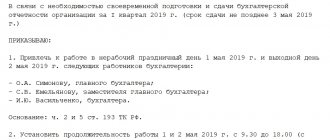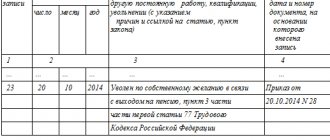The day of dismissal falls on a weekend
Collisions arise when an employee on a fixed-term employment contract has a shift or individual schedule that includes weekends.
For example, a day - two, a day - three, a week you work - a week at home, etc. Typically, such a schedule is for sellers, security guards, employees of consumer service enterprises, etc. But for the personnel service, accounting department and the head of the organization, then If the people involved in processing the dismissal of such an employee have a standard five-day work schedule.
There are several ways out of this situation:
- Pay the employee and issue documents to him on the last working day of the personnel and accounting department employees. There is a risk that after this the fired person may not return to work. After all, it’s rare that an employer will sue him for one or two days’ salary.
- Involve a personnel service employee to work on a day off, which is for the dismissed worker, with compensation for this in accordance with the Labor Code of the Russian Federation. And the payment should be made on the last working day before the weekend or holiday on which the dismissal date falls.
- Terminate the employment contract for other reasons, for example, by agreement of the parties.
The Labor Code of the Russian Federation describes situations when the employer is obliged to formalize dismissal on the day the application is submitted. We are talking about situations where an employee may not give notice of his intention to terminate the employment agreement, for example, when retiring or being called up for service.
Based on Art. 14 of the Labor Code of the Russian Federation, if the date specified in the employee’s application is a day off or an official holiday, then the employer has the right to complete all paperwork on the next working day. However, there are situations when there is no time to wait, for example, a conscript needs to arrive at the appointed place on Monday, but he works until Saturday inclusive.
Quite often in company practice situations arise when the day of dismissal falls on a weekend. This may be due to the fact that the party who made the decision to dismiss indicated the exact date of dismissal in the application or notice.
When writing an application by an employee or a notice by an employer, the requirements established by labor legislation must be observed:
- When an employee resigns at his own request, he writes a corresponding statement (80 Labor Code of the Russian Federation).
- When an employer reduces staff, he sends each employee a corresponding notice (180 Labor Code of the Russian Federation).
Thus, the minimum period can expire on both a working day and a non-working day.
| How to fire an employee if the day of dismissal falls on a weekend | Procedure |
| Make a payment in advance | You can pay the employee and issue documents to him on the last working day, when the HR and accounting department employees are working. |
| Dismiss an employee on a day off (for the administration, not for the employee being dismissed), and pay him in advance | Involve an employee of the HR department to work on a day off, and pay the employee on the last working day before the day of dismissal. |
| Find a compromise solution with the employee | Agree with the employee about dismissal on another basis (for example, by agreement of the parties). |
When is the last working day considered the day of dismissal?
As a general rule, the last working day is the day of dismissal. The employee must work it out in full, unless he has individual agreements with the employer.
But there are some exceptions:
- if an employee is on sick leave, but resigns of his own free will. He will not be physically able to be at work;
- if the day of dismissal falls on vacation. His last work shift will be the last day before vacation;
- if the dismissal falls on a weekend. If a citizen works on a shift schedule, when a working day, in principle, may fall on a general day off, the last working day will be considered the next after the day off.
The day of dismissal will be considered the last working day only if the citizen can actually work it, his schedule and other factors allow him. If not, then the working day is either postponed or the person is dismissed without appearing.
Normative base
To understand where work on a day off can come from, you need to refer to the procedure for calculating wages and find out how to make a dismissal on a day off and when to pay the salary.
The legislator allows enterprises to choose a payment system, for example, if production conditions require assigning shifts or working on weekends or holidays. The payment for such an organization of labor is quite equivalent - an employee who has written an application for termination of employment relations can count on the final payment under Article 140 on a non-working day.
We suggest you read: Law on noisy work in Moscow
The Labor Code states that the last day of work is the day of dismissal. On this date, the citizen still formally performs his duties and fills out a bypass sheet. There is no clear reference in the law as to which day may be selected for final settlement. Therefore, the opinion that it is impossible to fire someone on a day off is hasty and even erroneous.
Procedure for dismissal on weekends and holidays
If an employer discovers that the dismissal date falls on a holiday or just a day off, then he asks some questions. Is it possible to pay an employee on a day off? Is it possible to issue a dismissal order on a day off?
For the employer, setting the date of termination of the employment relationship is extremely important, since it is on this day that the following should be done:
- pay the employee a salary;
- pay the dismissed person compensation for unused vacation, severance pay and other payments provided for by the Labor Code of the Russian Federation and the employment contract;
- issue a work book with a notice of dismissal included in it (this entry will be dated on a day off);
- provide the employee with copies of the necessary documents;
- familiarize the employee with the dismissal order.
| ★ Best-selling book “Accounting from Scratch” for dummies (understand how to do accounting in 72 hours) purchased by {amp}gt; 8000 books |
As a rule, employers do not fire employees on a day off, since in this case the employee will not receive either a work permit, documents, or the required payment. Therefore, some companies postpone the day of dismissal to the next working day, or dismiss on the last working day before the date of dismissal.
Usually they resort to the first method. For example, if the end date of the so-called two-week “work” falls on Saturday or Sunday, then dismissal occurs on the following Monday. On this day, a dismissal order is issued, and a settlement is made with the employee and he is given a work book.
The method of dismissing an employee a day earlier is based on the protection of workers' rights. Since postponing dismissal to a later date forces the employee to return to his previous place of work outside the period provided for by law. That is, the employee is forced to report to work at the former employer instead of starting work at a new place of work. For the employer, this may be regarded as a violation, for example, a delay in issuing a work book.
Great difficulties arise for employers if the weekend continues for several days in a row. For example, when postponing public holidays. With such a delay, even more time will be wasted. Therefore, in order to avoid claims from a dismissed employee, the employer should issue an order and dismiss the employee ahead of schedule.
In this case, the employee familiarizes himself with the order and receives his salary and due payments on the last working day. This means that on Monday he will be able to go about his business and will not need to come to his former employer.
However, the employer should remember that some risks may arise when dismissing a day earlier. For example, an employee can exercise his right and withdraw his resignation letter on this day off (80 Labor Code of the Russian Federation). This means the dismissal order will need to be canceled and the entry in the work book corrected.
Employer's actions on the day of dismissal
Each working day must be paid in accordance with the contract, its annexes and current legislation. Accordingly, the employer is obliged to pay wages and other payments for the day of dismissal, which is considered the last working day.
On the last day, the employer needs to complete a number of actions:
- issue an order to dismiss an employee. The document must contain the details of the parties, the basis for dismissal and the date from which the relationship will be considered terminated;
- familiarize the employee with the dismissal order. If he refuses to sign, this fact must be recorded and the order sent to the last known address;
- issue the employee with a work book if the employer had one;
- make payments to the employee in full.
The work record book is sent to the employee by mail only with his consent. Otherwise, you should send him a notification about the need to receive it and leave it for storage.
You should hire a new employee only the next day. The law does not prohibit hiring for the same position earlier, but such actions will lead to additional difficulties, especially for the accountant and clerk. You will have to create a new position that will duplicate an existing one, and then eliminate the same unit.
Step-by-step registration instructions
The content of part three of Article 84 of the Labor Code does not contain a clear requirement regarding when employees should be counted - on a working or non-working day. It turns out that a day off is quite suitable for dismissal and issuance of a book with records of the place of work. There are cases when the employer is prohibited from changing the date of exclusion of an employee from the lists of the enterprise.
For example, when a legal entity is on the threshold of organizational and staffing measures. If you do not dismiss the employee within the period established by the decision of the general meeting of shareholders and duplicated in the notice, the employment relationship is considered to continue. In this case, the dismissal procedure must be repeated again.
We invite you to read: How to challenge the conclusion of a forensic medical examination
If a company employee does not come to work on his day off and he must be fired, the administration will have to follow the following action sequence:
- An application for termination of the employment contract is drawn up. Particular attention is paid to clarifying the grounds for dismissal on a day off, the visa of the head of the unit;
- An order is issued, the text of which indicates the personal data of the employee, the basis for exclusion from the staff and the date. The employee familiarizes himself with the administration's order against signature;
- The work book is filled out, pay slips are prepared for payment;
- Payment and dismissal on Sunday when to pay.
Among the nuances when dismissing on a day off is the employment of a new citizen. If the former employee is not expelled, an order is not issued, or changes are not made to the work book, the position cannot be held. This must be done if there is no agreement with the employee to postpone the dismissal procedure to a working day for the administration.
According to
when leaving - dismissal on a day off at his own request, the employee must notify the employer 14 days in advance. The end of the working period may fall on a weekend or holiday.
To avoid conflict situations, it is recommended to agree with the employee so that he draws up a new application indicating the date of departure on a working day.
If he does not agree to postpone the moment of termination of the agreement, the order is issued the next day after the rest. There may be a problem when an employee has to go to a new place on Monday, so a compromise will need to be sought.
It happens that an employee’s dismissal occurs during holidays that last for several days in a row. If you act according to the rules of Article 14 of the Labor Code of the Russian Federation, this will delay the preparation of documents. It is possible to issue an order in advance with a dismissal date on holidays.
Example 1. 04/28/2018 I.N. Lyutikova submitted her resignation of her own free will, without entering the date of termination of the contract. The end of the two-week working period was on Saturday – 05/12/2018. She refused to reschedule her departure date. Since she needed to go to a new place from 14.05.
However, the employee retains the right to withdraw the application within a 2-week period. In this case, the order will need to be canceled and adjustments made to the work book, since the employee retains the right to a workplace.
The reasons for dismissal at the initiative of the employer are listed in Article 81 of the Labor Code of the Russian Federation. It is important that the contract termination procedure is followed and supporting documents are prepared (for example, an internal investigation report, a notice of warning to employees about staff reduction).
How to determine the date of dismissal
The employment contract is terminated in the following cases:
- The employee submitted his resignation of his own free will. At the same time, it is not necessary to explain the reason why a person wants to terminate the employment relationship; expressing one’s own desire is enough;
- the staff reduction procedure begins and the employer has issued a corresponding order;
- dismissal is implemented for violation of disciplinary standards, for example, absenteeism or repeated tardiness;
- the employer and employee decided to terminate the relationship by mutual agreement. The reason may also not be explained; the coinciding will of both parties is sufficient.
The date of dismissal will be considered the one indicated in the order. It is determined depending on the grounds for termination of the contract. Thus, the court decision will indicate the date, which must be entered in the documentation; when terminating the contract at the initiative of the employee, a two-week period is taken into account (or the one to which both parties come, by mutual agreement, etc.).
In a resignation letter, an employee usually indicates the date from which he asks to terminate the employment relationship with him. If this date does not correspond to fourteen days, then everything depends on the agreement between the parties. The period begins to be calculated from the next day after filing the application for dismissal.
Upon termination of the employment relationship by mutual agreement, the parties have the right to indicate any date that suits everyone. If the parties cannot agree on this or something else, dismissal will be made on other grounds, for example, at the request of the employee. The agreement of the parties presupposes agreement on all points.
Read: What to do if the employer does not sign the resignation letter
Is the dismissal date postponed?
If the date falls on a weekend, the next working day will be considered the day of dismissal. The rule applies in all cases, no matter what the employee’s schedule is.
If a person does not go to work for a good reason, then the working day is not postponed. The previously determined date will be considered the day of dismissal, but will not be a working date. The most common example is sick leave.
Dismissal can be canceled if the employee, during the working period (which lasts, most often, 14 days), changes his desire and informs the employer about this. At the same time, management cannot refuse to continue his employment relationship. If termination is carried out by mutual agreement, then restoration is also implemented.
Order date
According to current legislation, namely Article 84 of the Labor Code, it is impossible to dismiss an employee on a day off. The date of termination of employment should be postponed to the next working day (next). If the situation reaches a dead end and the employee decides to quit on a day off, you can still adjust the date due to working hours, making it, for example, not 14, but 12 days. This right is enshrined in Article 14 of the Labor Code.
Free legal consultation
We will answer your question in 5 minutes!
Free legal consultation
We will answer your question in 5 minutes!
Dismissal on a day off during a shift work schedule
A slightly different situation may arise for employees working in shift work. For an employee, this day may be a working day, and for an employer this day may be a day off. This means that the administration and personnel department do not work on this day.
In this case, the date of termination of the employment contract falls on the employee’s last working day and this day must be the date of termination of the employment contract, and also be indicated in the dismissal documents. The employee works this day in full, after which he receives the final payment. At the same time, the manager, as well as employees of the HR and accounting departments, should take care in advance that employees of working departments on a day off make payments to the employee in accordance with the requirements of the Labor Code of the Russian Federation.
To dismiss an employee directly on a day off, a personnel officer and an accountant will need to be involved in work on their day off. In this case, the employer faces risks that employees perform their work functions on non-working days. This is possible only in the following cases (113 Labor Code of the Russian Federation):
- with the written consent of the employee, if this is not related to the prevention and elimination of emergency situations (for example, accidents, disasters, etc.);
- for the purpose of performing unforeseen work that is related to the performance of the company or its individual divisions;
- if the employee has no contraindications (for example, disabled people, women with children under 3 years old).
We suggest you read: Is it possible to refuse an inheritance in favor of a sister?
Calculation of due payments
Regardless of the date of termination of the employment relationship, the employer remains obligated to pay accruals due on the day of dismissal:
- Wages calculated in proportion to the time worked;
- Compensation for vacation days that were not used by the date of dismissal;
- Severance pay in cases established by law or internal regulations of the company. The specified payment is calculated based on average earnings;
- Other payments provided for by corporate agreements.
The main types of wages upon dismissal on a day off are compensation for unused vacation and wages for hours worked after the last scheduled payment.
For example, an employee of organization N with a salary of 25,000 rubles and an average daily earnings of 900 rubles wrote a letter of resignation. At the time of his application, he had unused vacation and work time left. Due to his illness, he cannot come, so he sent a letter of application by registered mail. He should be compensated for leave of a standard duration of 28 days and 9 working days. The payment will be 900*(28 9) =33300 rubles.

The same should be done with the work book and other work-related documents that the employer is obliged to provide to the employee - they must be given to the employee before going on vacation, i.e. on the last day of work. This conclusion also follows from the Ruling of the Constitutional Court of the Russian Federation dated January 25.
2007 N 131-О-О. In other words, in fact, the employment relationship with the employee ends from the moment the vacation begins. That is why, in accordance with Part 4 of Art. 127 of the Code, an employee who has been granted unused leave with subsequent dismissal on his own initiative does not have the right to withdraw his resignation letter after the start of the leave, even if this is only the first day of the leave.
What to do if, when moving to a new job, weekends are not included in the hours worked?
Galina Enyutina
Headhunter Magazine
I quit my job on Friday and start a new job on Monday. How not to lose your weekend? What can be done to ensure that they enter the time worked?
Galina Enyutina , lawyer at the Center for Social and Labor Rights, answers :
- The last day of work, according to Art. 77 of the Labor Code of the Russian Federation, the day of dismissal is recognized. Including days off in your worked hours today will not bring you additional material benefits.
The fact is that settlements with a resigning employee are made based on the average daily earnings for all days worked by him in the last month (Article 139 of the Labor Code of the Russian Federation).
Thus, if in the organization where you work, Saturday and Sunday are non-working days, then the amount of the calculation upon dismissal will be the same - regardless of what day you register your dismissal: Friday, Saturday or Sunday.
From January 1, 2007, in accordance with Art. 7 of the Federal Law “On provision of benefits for temporary disability, pregnancy and childbirth of citizens subject to compulsory social insurance”, the amount of these benefits does not depend on the length of continuous work experience. Their payment is affected only by the insurance period, that is, the total length of time for paying insurance premiums and/or taxes (Article 3 of the Federal Law “On the Fundamentals of Compulsory Social Insurance”). In your case, dismissal on Friday rather than Sunday will not entail changes in the payment of insurance premiums and taxes.
Currently, the concept of “continuous work experience” is losing its legal meaning. However, many people do not understand the changes to the Social Security system. Not being confident in the stability of legislation, citizens sometimes try to maintain continuous work experience “just in case.” Even if you hold similar views, you still shouldn’t worry. In accordance with clause 2 of the Rules for calculating the continuous work experience of workers and employees when assigning state insurance benefits, approved by Resolution of the Council of Ministers of the USSR of April 13, 1973 No. 252 (the Rules apply to the extent that does not contradict the new legislation), upon dismissal of one’s own free will continuous work experience is maintained provided that the break in work does not exceed three weeks.
Thus, due to the loss of days off, your insurance or work experience will not be interrupted. Of course, you can quit on a day off, but only by agreement with the employer, who has the right not to satisfy your request.







